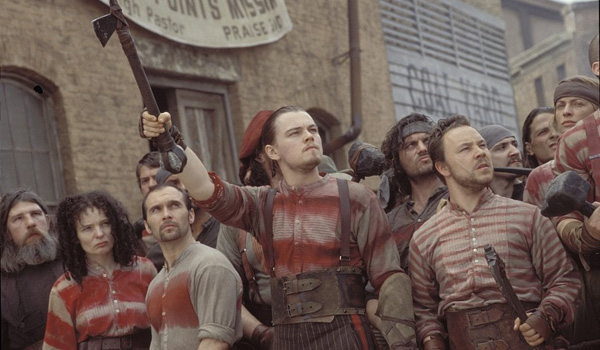Gangs of New York Review
“My father told me we was all born of blood and tribulation, and so then too was our great city.”
This beautiful quote just about closes Martin Scorsese’s impossibly epic Gangs of New York. And it’s a fitting one to sum up both the film’s plot and biggest themes. The Amsterdam Vallon we come to know is born of blood and tribulation. His father, Priest Vallon (Liam Neeson), is murdered by the dagger of Bill the Butcher (Daniel Day-Lewis) during a fight between “native” New Yorkers and Vallon’s ragtag group of mostly Irish immigrants. The Five Points of New York City is the prize they fight for, and after striking down Vallon, Butcher rules the area and proudly raises his bloody cleaver to anyone who dares defy him (and anyone who doesn’t look or speak just like him).
Little Amsterdam runs away, only to return a in decade or more (in the form of Leonardo DiCaprio) for vengeance. He finds many of his father’s closest allies are now in the pocket of the Butcher. He also finds America about to burst. The blood feud between he and Bill is merely a microcosm for the Civil War that threatens every able-bodied man unable to afford the $300 deferment fee.
Scorsese spends an inordinate (but seemingly appropriate) amount of time building an incredibly detailed world that he ultimately tears apart and burns it to the ground. There’s something beautiful about how helpless Bill, Amsterdam, and the others are while many of New York’s men and women lay dead in pools of blood that used to be city streets. The moving coda really hits home the idea that these individuals’ respective sacrifices helped shape both New York and, more broadly, America. You’ll hardly recognize either—they’re both ugly, dirty places filled with ugly, dirty, violent, bigoted men and women—but change sweeps through as the nearly three-hour film marches through our nation’s history, and while we don’t exactly see the city born anew, we recognize that enough has transpired to turn a page in the story of America.
Of course, the big-picture stuff doesn’t really show itself until the film’s final act, and leading up to it, the Amsterdam-Bill blood feud is front and center. This works best during the film’s first half when Amsterdam returns from a nearly lifelong, self-imposed exile and hardly anyone, including Bill, recognizes him. The interplay between the two is breathlessly tense. Of course, he’s eventually discovered, and what ensues is a little more familiar, but it’s so big and grand that you can’t help but find yourself wrapped up in all of it.
Gangs of New York, more so than perhaps any of Scorsese’s other post-millennium films, is loaded with unironic humor. The tracking shot (there’s always at least one with Scorsese) that establishes what nightlife is like in the Five Points feels like its straight out of an Irish version of Pirates of the Caribbean. Significant time is spent with Jim Broadbent’s William Tweed—a sleaziest of all the sleazy politicians of this time and place. His idea of free and fair elections is pretty hilarious, as is his determination to lead the city’s most heroic and successful fire brigade.
This is the first of many collaborations between Martin Scorsese and Leonardo DiCaprio, and while it’s been a fruitful relationship for both men, it didn’t exactly start out amazingly. The young man is fine as Amsterdam, but he’s completely overshadowed in every imaginable way by a smoldering Daniel Day-Lewis, who gives one of the best performances of his career. Bill is an unequivocally bad guy (take note of a scene late in the film when he confronts a political rival), but his toughness and the strength he has in his convictions (as wrong-footed as they might be) is admittedly admirable. Despite being rivals in life, he loves Amsterdam’s father and the way he fell fighting for what he believed in. Bill has no time for cowardice and chicanery. He’s old-fashioned and utterly fascinating as played by Day-Lewis.
Cameron Diaz plays a third key role as Amsterdam’s love interest, Jenny. She’s a thankless character, and Diaz does very little to make her jump off the screen. Beyond this main trio, Broadbent, Brendan Gleeson, Liam Neeson, and others contribute solid supporting work.
Within Scorsese’s filmography, Gangs of New York stands out as a bit of an anomaly (and it marks the beginning of a decade in his career defined by anomalies). Yes, he’s back filming his favorite city in the world, but it’s a much different time and place than we’ve seen him tackle over three decades. Certain themes stand out as familiar, but the sprawling nature of it all feels atypical for the usually calculated director, and the passion that bursts off the screen isn’t something we’ve seen in a film of his in at least a decade. For these reasons and so many more, it’s one of his very strongest films.















